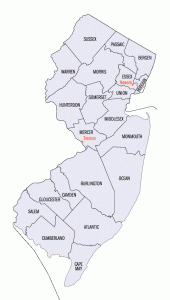New Jersey Tax
New Jersey State Tax
New Jersey Income Tax
 New Jersey residents are required to file income tax returns for incomes from all sources. Anyone who earned at least $10,000 in the preceding tax year must file his income tax return to the New Jersey Division of Revenue on or before Tax Day on April 15. The New Jersey marginal income tax rates are spread in six brackets ranging from 1.4% to 8.97%. The maximum marginal income tax rate in New Jersey is the 4th highest in the United States.
New Jersey residents are required to file income tax returns for incomes from all sources. Anyone who earned at least $10,000 in the preceding tax year must file his income tax return to the New Jersey Division of Revenue on or before Tax Day on April 15. The New Jersey marginal income tax rates are spread in six brackets ranging from 1.4% to 8.97%. The maximum marginal income tax rate in New Jersey is the 4th highest in the United States.
The maximum marginal corporate income tax in New Jersey is the 6th highest in the country. Any business or corporation that earned at least $100,000 in New Jersey is required to file corporate income tax.
Groceries, prescription drugs, clothing items, and household paper products are exempted from state sales tax in New Jersey. The state also exempts utilities such as water, gas, fuel, and electricity. Like in most states, however, gasoline products are subject to excise tax.
The maximum state sales tax rate in New Jersey is 7%. The state has special Urban Enterprise Zones that collect only half of the state tax rate.
Property tax applies to all real estate properties in New Jersey. Municipalities from each county have their own property assessors that determine the fair market value of properties subject to tax. Unlike state income and sales taxes, property tax is regulated by the county or municipality where it is collected.
The average property tax rate in New Jersey is the highest in the United States.

